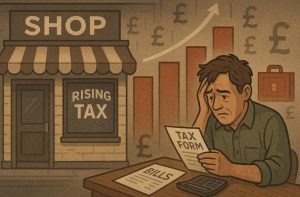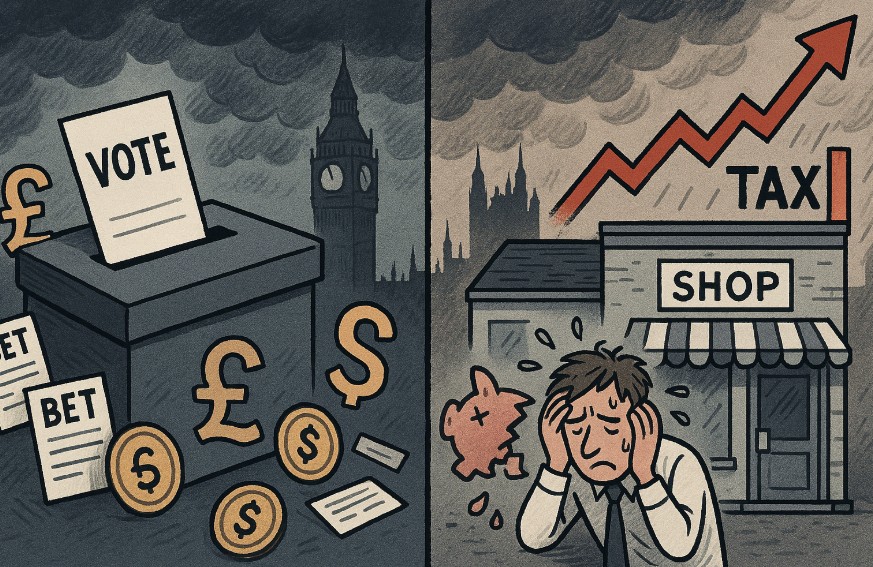Table of Contents
ToggleWhat happens when political speculation, insider knowledge, and rising tax burdens collide? For UK businesses, the answer is an increasingly volatile economic environment shaped by both scandal and policy. In the wake of the 2024 General Election, the UK Gambling Commission has charged 15 individuals for allegedly placing general election bets using confidential information highlighting serious ethical concerns in the betting industry.
At the same time, businesses across the country are grappling with a sharp rise in corporate taxes and tighter regulatory controls. From small startups to established firms, the combination of political instability and fiscal pressure is impacting financial planning, operational strategies, and overall business confidence.
This article explores how the convergence of general election betting scandals and tax policy changes is affecting UK enterprises and what actions business owners can take to stay ahead in uncertain times.
Why Are General Election Bets on the Rise in the UK?

Political betting has become increasingly prevalent across the UK, particularly in the run-up to general elections. The ability to wager on election outcomes, candidate victories, and even the date of the election itself has seen a noticeable uptick. Once considered a niche market, general election bets have now emerged as a mainstream offering by major bookmakers and online platforms such as Betfair, William Hill, and Ladbrokes.
This rise in political betting has been fuelled by heightened political engagement, widespread media coverage, and the accessibility of digital platforms. Punters are not just casting their votes they’re placing their bets. However, with growing popularity comes increased scrutiny, particularly around the legality and fairness of betting practices.
How Is the Gambling Commission Responding to Election Betting Offences?
On 14 April 2025, the UK Gambling Commission charged 15 individuals under the Gambling Act 2005, following an extensive investigation into cheating allegations related to general election bets. The inquiry began in June 2024 and focused on individuals suspected of using confidential information—namely, advance knowledge of the 2024 General Election date to gain an unfair edge in betting markets.
Such actions fall under Section 42 of the Gambling Act 2005, which defines the use of insider information in betting as a criminal offence. This incident has raised serious ethical and legal questions surrounding political gambling.
Individuals Charged
- Simon Chatfield (Farnham)
- Russell George (Newtown, Wales)
- Amy Hind & Anthony Hind (Loughton, Essex)
- Jeremy Hunt (Horley, former police officer)
- Thomas James (Brecon, Wales)
- Charlotte Lang (Brixton, London)
- Anthony Lee & Laura Saunders (Bristol)
- Iain Makepeace (Newcastle Upon Tyne)
- Nick Mason (Gillingham)
- Paul Place (Hammersmith, London)
- James Ward (London, E11)
- Craig Williams (Welshpool)
- Jacob Willmer (Richmond, London)
These individuals are set to appear at Westminster Magistrates’ Court on 13 June 2025.
This case, which is separate from an earlier Metropolitan Police investigation that was later dropped, is now being led solely by the Gambling Commission. Under Sections 27 and 28 of the Gambling Act, the Commission has authority to investigate and prosecute criminal gambling offences.
The regulator has reaffirmed its commitment to upholding transparency and public trust in gambling markets, particularly during sensitive electoral periods. It has also stated that no further comments will be made while the legal proceedings are ongoing.
What Do the Latest UK Tax Increases Mean for Small Businesses?

As political betting scandals unfold, UK businesses are facing another pressing challenge: a surge in tax burdens. The Spring Budget 2025 introduced several new measures, including increased corporation tax, higher dividend taxes, and revalued business rates all of which are tightening financial pressures on startups and SMEs.
Recent UK Tax Policy Changes
| Tax Policy | Description | Impact on Business |
| Corporation Tax | Increased from 19% to 25% for profits over £250,000 | Reduced post-tax profits for larger SMEs |
| Dividend Tax | Raised by 1.25 percentage points | Higher tax on business owner withdrawals |
| Business Rates | Revalued, particularly affecting high-street premises | Increased operating costs |
These changes, while aimed at boosting national revenue, have provoked concern among entrepreneurs and business leaders. Many fear that such increases could lead to reduced investment, layoffs, or even closure for those operating on thin margins.
How Does Political Betting and Uncertainty Impact Business Stability?
Political instability has always had a ripple effect on economic performance. With ongoing investigations into general election bets, public trust in political institutions is wavering creating an uncertain climate for business operations and financial forecasting.
When elections approach or scandals arise, investor confidence typically drops. Venture capital firms may pause funding rounds, banks tighten lending criteria, and consumer spending becomes more conservative. This is particularly damaging for startups and SMEs that rely on clear policy direction and favourable economic conditions to grow.
Furthermore, scandals related to political betting could taint public perception of certain businesses especially those involved in or associated with gambling, media, or politics. Reputational damage, in this environment, can have as much impact as financial penalties.
What Is the Combined Impact of General Election Bets and Tax Policy on UK Business Operations?

When political scandals and fiscal tightening collide, UK businesses are left navigating a treacherous economic landscape. The convergence of general election bets controversies and tax increases introduces both operational and strategic challenges.
Key Impacts on Business Operations
- Budget Reallocation: More funds diverted to tax payments, reducing budgets for innovation and hiring.
- Reputational Risk: Businesses linked to political or betting scandals may suffer consumer backlash.
- Operational Uncertainty: Policy unpredictability hinders long-term planning.
- Compliance Costs: Stricter regulatory scrutiny increases legal and administrative expenses.
Some businesses have already postponed expansion plans, while others are preparing for a reduction in staff or product offerings due to tightening margins and falling confidence.
How Can UK Businesses Navigate Political and Economic Uncertainty?

While the economic environment is undoubtedly challenging, UK businesses are not without recourse. Strategic planning, informed decision-making, and prudent financial management can help enterprises weather the storm.
Strategies for Navigating Uncertainty
- Financial Resilience: Build cash reserves and reassess capital expenditure.
- Scenario Planning: Prepare for multiple political and tax policy outcomes.
- Policy Engagement: Join trade bodies or chambers to stay informed and advocate change.
- Digital Transformation: Invest in technology to streamline operations and reduce costs.
- Risk Management: Monitor exposure to political developments and regulatory changes.
- Ethical Standards: Ensure transparency and distance from controversial markets like political betting.
These steps can help UK businesses remain agile and responsive during times of change, while still pursuing long-term growth.
Conclusion: How Should UK Businesses Prepare for the Future?
The convergence of general election bets scandals, regulatory enforcement, and increased tax pressure represents a significant shift in the UK’s political and business landscape. For companies, especially SMEs and startups, the road ahead will demand both adaptability and foresight.
Proactively addressing risks, maintaining compliance, and embracing innovation are now more important than ever. By staying informed and agile, UK businesses can not only survive these turbulent times but emerge stronger and more resilient.
FAQs About General Election Bets, Tax Changes, and UK Businesses
Are general election bets legal in the UK?
Yes, political betting is legal. However, using insider knowledge to influence bets is considered cheating and is a criminal offence under the Gambling Act 2005.
What charges were made in the 2024 general election betting scandal?
15 individuals were charged for allegedly using confidential information to profit from bets on the election date, a violation of the Gambling Act.
How do tax increases affect business profitability?
Higher taxes reduce profit margins, limit reinvestment, and increase overall operational costs especially for SMEs and growing startups.
What steps can small businesses take to reduce tax burdens?
Engaging tax advisors, optimising business structures, and utilising relief schemes are effective ways to manage tax obligations.
Can political scandals impact investor decisions?
Absolutely. Investors often hold off on funding or acquisitions during political scandals or unstable climates, impacting business growth.
Are there risks for businesses associated with betting industries?
Yes. Reputational damage, stricter compliance requirements, and public criticism can affect companies tied to gambling or political betting.
What long-term strategies help businesses during economic instability?
Building cash flow reserves, staying policy-aware, and investing in digital efficiency are key to long-term survival during political or fiscal upheaval.




